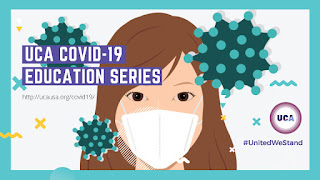48: Prevention Tips for Expecting Mothers
Q: Are pregnant women more susceptible to COVID-19?
💁Tracy: According to the current research, there is no evidence that pregnant women are more or less susceptible to COVID-19.
Q: If I am pregnant, do I still need to go to obstetric examinations regularly during the COVID-19 pandemics?
💁Tracy: First of all, obstetric examinations are still very important to the health of fetuses and mothers. Some of the OB GYN examinations are especially important, such as screenings for abnormal pregnancies, Down Syndrome, gestational diabetes mellitus, cervical cancer, and abnormal vaginal discharge.
You also need to meet with your doctors to decide on a suitable delivery plan. However, considering the current situation of COVID-19 pandemic, expecting mothers should consult with their obstetricians on whether they can reduce office visits by taking basic measurements at home, such as weight, blood pressure, body temperature, and blood sugar. Women in early pregnancy should always pay attention to physical changes in their bodies. For women in late pregnancy, it is important to follow your doctor’s directives.
Contact your doctors immediately if you have any questions or concerns.
Q: Will giving birth in a hospital increase the chance of being infected with COVID-19?
💁Tracy: Hospitals normally keep COVID-19 patients in separate wards to minimize exposure to the public and other patients. During the pandemic, most hospitals have changed their systems to reduce the number of visitors and delayed elected procedures. Many hospitals have also set up strict screening procedures at the entrance to reduce COVID-19 exposure risk. Please talk to your doctors on how to best arrange for office visits and examinations during your pregnancy.
Q: How can expecting moms reduce their anxiety related to COVID-19 exposure?
💁Tracy: It is quite normal that expecting moms experience some degree of anxiety and stress during their pregnancies, especially if this is your first pregnancy. COVID-19 certainly adds more to this stress. To reduce this anxiety, find ways that work best for you, for example, by taking up a meditation practice, appropriate physical exercises, listening to music, preparing your home for the baby, and other things recommended by your doctors.
In addition, family and social support can be also very helpful, for example, by talking to other expecting moms and joining a support group. There are many online resources that have been made available to the public on how to relieve anxiety and stress during the COVID-19 pandemics.

💁Tracy: According to the current research, there is no evidence that pregnant women are more or less susceptible to COVID-19.
Q: If I am pregnant, do I still need to go to obstetric examinations regularly during the COVID-19 pandemics?
💁Tracy: First of all, obstetric examinations are still very important to the health of fetuses and mothers. Some of the OB GYN examinations are especially important, such as screenings for abnormal pregnancies, Down Syndrome, gestational diabetes mellitus, cervical cancer, and abnormal vaginal discharge.
You also need to meet with your doctors to decide on a suitable delivery plan. However, considering the current situation of COVID-19 pandemic, expecting mothers should consult with their obstetricians on whether they can reduce office visits by taking basic measurements at home, such as weight, blood pressure, body temperature, and blood sugar. Women in early pregnancy should always pay attention to physical changes in their bodies. For women in late pregnancy, it is important to follow your doctor’s directives.
Contact your doctors immediately if you have any questions or concerns.
Q: Will giving birth in a hospital increase the chance of being infected with COVID-19?
💁Tracy: Hospitals normally keep COVID-19 patients in separate wards to minimize exposure to the public and other patients. During the pandemic, most hospitals have changed their systems to reduce the number of visitors and delayed elected procedures. Many hospitals have also set up strict screening procedures at the entrance to reduce COVID-19 exposure risk. Please talk to your doctors on how to best arrange for office visits and examinations during your pregnancy.
Q: How can expecting moms reduce their anxiety related to COVID-19 exposure?
💁Tracy: It is quite normal that expecting moms experience some degree of anxiety and stress during their pregnancies, especially if this is your first pregnancy. COVID-19 certainly adds more to this stress. To reduce this anxiety, find ways that work best for you, for example, by taking up a meditation practice, appropriate physical exercises, listening to music, preparing your home for the baby, and other things recommended by your doctors.
In addition, family and social support can be also very helpful, for example, by talking to other expecting moms and joining a support group. There are many online resources that have been made available to the public on how to relieve anxiety and stress during the COVID-19 pandemics.
References
[1] https://www.cdc.gov/coronavirus/2019-ncov/need-extra-precautions/pregnancy-breastfeeding.html
[2] WHO: Q&A on COVID-19, pregnancy, childbirth and breastfeeding
[3] Harvard Health Publishing: Pregnant and worried about the new coronavirus?
[4] https://www.acog.org/patient-resources/faqs
[2] WHO: Q&A on COVID-19, pregnancy, childbirth and breastfeeding
[3] Harvard Health Publishing: Pregnant and worried about the new coronavirus?
[4] https://www.acog.org/patient-resources/faqs
Writing: Li Siyi; Proofreading: Helen Shih, Suzhen Jiang; Artwork: Astro







